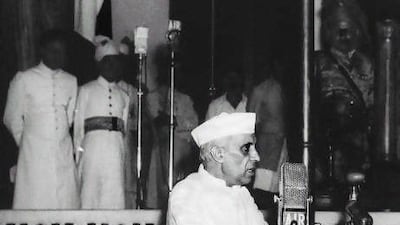NEW DELHI // A short, grainy video from 65 years ago today shows the then prime minister of India, Jawaharlal Nehru, standing at the podium in parliament under a whirring fan, dressed in a silk jacket with his signature rose in the buttonhole, and addressing the noisy constitutional assembly.
The life of an India free from British rule began with that speech.
While Nehru often spoke extemporaneously, he scripted this particular moment.
In the video, India's first prime minister frequently looks down at his notes, speaking in his familiar clipped accent he acquired at school in Great Britain.
"At the stroke of the midnight hour, when the world sleeps, India will awake to life and freedom. A moment comes, which comes but rarely in history, when we step out from the old to the new, when an age ends, and when the soul of a nation, long suppressed, finds utterance."
The speech still resonates in India because it genuinely captured the moment in the way great speeches can, said Srinath Raghavan, a historian with the Centre for Policy Research in New Dehli.
"That was the great ability of people like Nehru, who are able to take historic moments, of which he was a part, [and] cloak them in language that is so memorable.''
In the speech, informally called A Tryst with Destiny after a phrase in its first sentence, Nehru proclaimed that "history begins anew for us, the history which we shall live and act and others will write about".
Aditya Mukherjee, a professor of contemporary Indian history at the Jawaharlal Nehru University in New Delhi, said that Nehru's "profound and very poetic" prose reflected his intellectual pedigree and sweep of history.
The power behind the speech, Mr Mukherjee said, was in Nehru's intellectual awareness of the challenges presented to him.
"The speech also has that quality where the world stands at the end of war and the beginning of freedom."
The key phrase of the speech - "a tryst with destiny" - was adapted from an address by the US president Franklin D Roosevelt, titled A Rendezvous with Destiny, delivered at the 1936 Democratic party convention in Philadelphia.
Nehru wrote his speech not only in advance of India's freedom from British rule but also under the cloud of tragic circumstances.
A month earlier, after he had agreed to the British partition of India along religious lines, violence had torn apart the state of Punjab divided by the newly created India-Pakistan border.
Hindu refugees in Pakistan began fleeing into India, and Muslims from India started an exodus to Pakistan.
"Raids and murders are now so frequent that it is difficult to keep track," wrote Evan Jenkins, the last governor of Punjab, in a letter to Lord Louis Mountbatten, the last British viceroy of India, on August 13, 1947. The situation in Lahore was so grim, Jenkins wrote, that "neither the railways nor the main roads are safe".
The bloodshed of partition must have played on Nehru's mind, said Mr Raghavan.
"He makes it very clear. He says that freedom has been won 'not wholly or in whole measure, but very substantially'. He's making the qualification that this was not the freedom he sought.
"He's accepting that the Congress [party] is facing a moment of failure, in not winning a united India, but he's also saying: what are we going to do with what we have now?"
In his book, A Region in Turmoil, the historian Rob Johnson quoted Nehru as saying later: "I was hardly aware of what I was saying, the words came welling up, but my mind could only conceive the awful picture of Lahore in flames."
Nehru's speech managed to transcend its immediate context of strife and apply to a larger trend of history, said Mr Mukherjee.
"The speech represented India at that moment in history, but it was a speech not just about India but also about where the world was on that day," he said.
Mr Raghavan recalled a story about an African-American journalist who found Nehru's speech inspiring.
"That was the beauty of the speech," Mr Raghavan said. "It wasn't just about India and Indians. It spoke for all colonised countries."
sbhattacharya@thenational.ae

